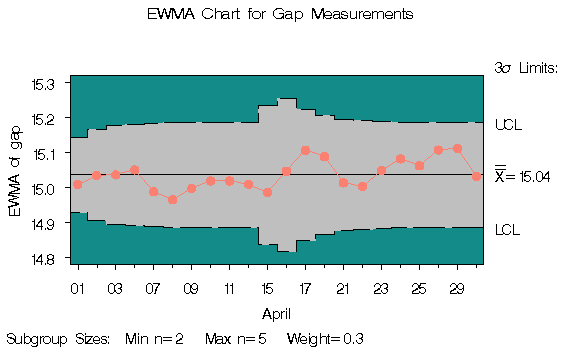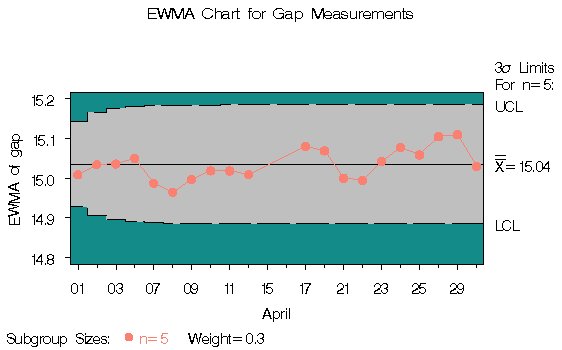Chapter Contents
Previous
Next
|
Chapter Contents |
Previous |
Next |
| EWMACHART Statement |
| See MACEW4 in the SAS/QC Sample Library |
This example contains measurements from the metal clip manufacturing process (introduced in "Creating EWMA Charts from Raw Data" ). The following statements create a SAS data set named CLIPS4, which contains additional clip gap measurements taken on a daily basis:
data clips4;
input day @;
length dayc $2.;
informat day ddmmyy8.;
format day date5.;
dayc=put(day,date5.);
dayc=substr(dayc,1,2);
do i=1 to 5;
input gap @;
output;
end;
drop i;
label dayc='April';
datalines;
1/4/86 14.93 14.65 14.87 15.11 15.18
2/4/86 15.06 14.95 14.91 15.14 15.41
3/4/86 14.90 14.90 14.96 15.26 15.18
4/4/86 15.25 14.57 15.33 15.38 14.89
7/4/86 14.68 14.63 14.72 15.32 14.86
8/4/86 14.48 14.88 14.98 14.74 15.48
9/4/86 14.99 15.16 15.02 15.53 14.66
10/4/86 14.88 15.44 15.04 15.10 14.89
11/4/86 15.14 15.33 14.75 15.23 14.64
14/4/86 15.46 15.30 14.92 14.58 14.68
15/4/86 15.23 14.63 . . .
16/4/86 15.13 15.25 . . .
17/4/86 15.06 15.25 15.28 15.30 15.34
18/4/86 15.22 14.77 15.12 14.82 15.29
21/4/86 14.95 14.96 14.65 14.87 14.77
22/4/86 15.01 15.11 15.11 14.79 14.88
23/4/86 14.97 15.50 14.93 15.13 15.25
24/4/86 15.23 15.21 15.31 15.07 14.97
25/4/86 15.08 14.75 14.93 15.34 14.98
28/4/86 15.07 14.86 15.42 15.47 15.24
29/4/86 15.27 15.20 14.85 15.62 14.67
30/4/86 14.97 14.73 15.09 14.98 14.46
;
Note that only two gap measurements were recorded on April 15 and April 16.
A listing of CLIPS4 is shown in Output 20.3.1. This data set contains three variables: DAY is a numeric variable that contains the date (month, day, and year) that the measurement is taken, DAYC is a character variable that contains the day the measurement is taken, and GAP is a numeric variable that contains the measurement.
Output 20.3.1: The Data Set CLIPS4
The following statements request an EWMA
chart, shown in
Output 20.3.2, for these gap measurements:
title 'EWMA Chart for Gap Measurements';
symbol v=dot c=salmon;
proc macontrol data=clips4;
ewmachart gap*dayc / weight = 0.3
cframe = vibg
cinfill = ligr
coutfill = yellow
cconnect = salmon;
run;
The character variable DAYC (rather than the numeric variable DAY) is specified as the subgroup-variable in the preceding EWMACHART statement. If DAY were the subgroup-variable, each day during April would appear on the horizontal axis, including the weekend days of April 5 and April 6 for which no measurements were taken. To avoid this problem, the subgroup-variable DAYC is created from DAY using the PUT and SUBSTR function. Since DAYC is a character subgroup-variable, a discrete axis is used for the horizontal axis, and as a result, April 5 and April 6 do not appear on the horizontal axis in Output 20.3.2. A LABEL statement is used to specify the label April for the horizontal axis, indicating the month that these measurements were taken.
Output 20.3.2: EWMA Chart with Varying Sample Sizes

|
The EWMACHART statement provides various options for working with unequal subgroup sample sizes. For example, you can use the LIMITN= option to specify a fixed (nominal) sample size for computing control limits, as illustrated by the following statements:
proc macontrol data=clips4;
ewmachart gap*dayc / weight = 0.3
limitn = 5
cframe = vibg
cinfill = ligr
coutfill = yellow
cconnect = salmon;
run;
The resulting chart is shown in Output 20.3.3.
Output 20.3.3: Control Limits Based on Fixed Sample Size

|
proc macontrol data=clips4;
ewmachart gap*dayc/ weight = 0.3
limitn = 5
alln
nmarkers
cframe = vibg
cinfill = ligr
coutfill = yellow
cconnect = salmon;
run;
The chart is shown in Output 20.3.4. The NMARKERS option requests special symbols to identify points for which the subgroup sample size differs from the nominal sample size.
Output 20.3.4: Displaying All Subgroups Regardless of Sample Size

|
The following statements apply all three methods:
proc macontrol data=clips4;
ewmachart gap*dayc / outlimits = cliplim1
outindex = 'Default'
weight = 0.3
nochart;
ewmachart gap*dayc / smethod = mvlue
outlimits = cliplim2
outindex = 'MVLUE'
weight = 0.3
nochart;
ewmachart gap*dayc / smethod = rmsdf
outlimits = cliplim3
outindex = 'RMSDF'
weight = 0.3
nochart;
run;
title 'Estimating the Process Standard Deviation';
data climits;
set cliplim1 cliplim2 cliplim3;
run;
The data set CLIMITS is listed in Output 20.3.5.
Output 20.3.5: Listing of the Data Set CLIMITS
|
|
Chapter Contents |
Previous |
Next |
Top |
Copyright © 1999 by SAS Institute Inc., Cary, NC, USA. All rights reserved.